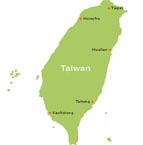China the obstacle as Taiwan seeks to host sport events
 Taipei - To most people, tchoukball does not sound like a ball game and life saving isn't a competitive sport.
Taipei - To most people, tchoukball does not sound like a ball game and life saving isn't a competitive sport.
But they are among the 31 sports at the World Games, for which some 4,800 athletes from 105 countries and regions will gather July 16-26 in Kaohsiung, Taiwan's second-largest city.
Taiwan hopes that holding the World Games (which feature non- Olympic sport) is a stepping stone for holding larger events like World Student Games, East Asian Games, Asian Games - and the Olympics.
"Hosting the Olympics is our final goal, but we must achieve our goals one by one," an official from the Sports Affairs Council told the German News Agency dpa.
"If we successfully host the World Games, we will qualify to apply to host the Universiade. After hosting the Universiade, we can apply to host the East Asian Games and so on," he said, speaking on the condition of anonymity.
However, things are not as simple as he said because China does not want Taiwan to host large international sports events, fearing Taipei might use the opportunity to promote its independence.
Taiwan is the seat of the Chinese Nationalist Government (ROC) which moved to Taiwan to set up its government-in-exile after losing the Chinese Civil War in 1949.
In 1971, the ROC government lost seat in the United Nations to China, and was expelled from all UN-related organizations in the following years.
In 1979, the International Olympic Committee (IOC) accepted China, but allowed the ROC, or Taiwan, to remain in the IOC under the name of Chinese Taipei Olympic Committee, hinting Taiwan is part of China.
When attending Olympic Games and single-sport events, the Taiwan team cannot hold Taiwan's national flag or use Taiwan's national anthem. The flag and song of the Chinese Taipei Olympic Committee are used instead.
While the Taiwan government accepted this humiliating arrangement, many Taiwanese are angry and protest it whenever they can.
Chi Cheng, a veteran track and field athlete and former director of the Kaohsiung World Games Organizing Committee, said Taiwan has the ability to host large international games but the obstacle is China.
"It is too complicated. And even after Taiwan has won the bid, it might lose it due to interference from China," she sighed.
According to Chi, after Kaohsiung has won the bid to host the 8th World Games in 2006, China in 2007 asked to take over hosting it and (the ruling body) IWGA was wavering.
"I and some other Kaohsiung officials flew to Switzerland for an emergency meeting with IWGA officials to prevent IWGA's giving the games to China," she said.
The negotiation ended with IWGA allowing Kaohsiung host the games, but Chi said it was so tense that she said she felt like a criminal standing trial.
"When other countries bid for hosting an international sports event, they only need to prove their capability. For Taiwan, it becomes a political issue. With China's emerging as a world power, no country dares to offend China," she said.
In May, Taipei lost to Gwangju, South Korea, in bidding o host the 2015 Summer Universiade, and Taiwan is seeking to host the 2017 Asian Games.
The East Asian Games, launched in 2003 and held every four years, involves only eight countries and regions - China, Hong Kong (China), Macau (China), Japan, South Korea, North Korea, Mongolia and Taiwan.
Mongolia, North Korea and Taiwan are the only members of the East Asian Games Association (EAGA) which have not hosted the games yet.
"If Taiwan loses to Mongolia and South Korea, we have to wait till every AEGA member has hosted it, then maybe EAGA will award it to Taiwan," Chi Cheng said. (dpa)